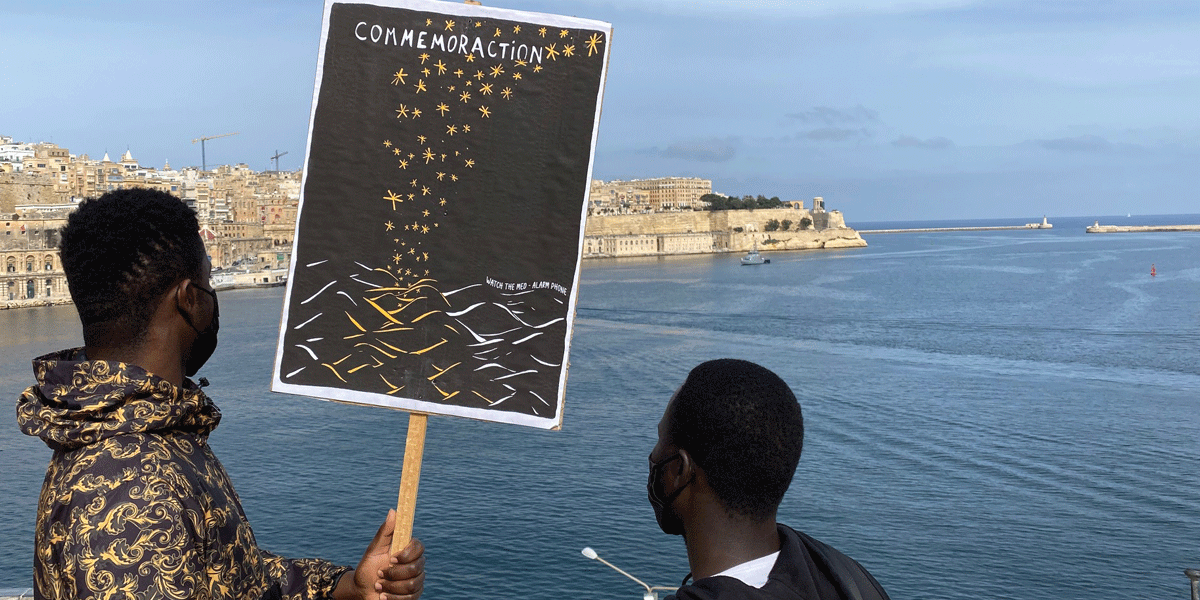


From Sea to City: Solidarity in Contested Spaces
Hagen Kopp and Maurice Stierl
WatchTheMed Alarm Phone, (formerly) Free the El Hiblu 3 Campaign
When 108 people were rescued by the tanker, the El Hiblu 1, in March 2019, the Alarm Phone, our hotline project in support of migrants in distress at sea, was not directly involved. Still, we followed the unfolding situation in the media and soon learned about the incredible injustice that the El Hiblu 3 experienced when reaching Malta. Abdalla, Amara and Kader were deprived of their freedom and imprisoned.
It was on 7 November 2019 when we met the three for the first time, in a courtroom in Valletta. We were only able to speak briefly during a break, whispering to each other. Abdalla confirmed that he had received a postcard in his prison cell that we had sent a few weeks earlier in order to express our solidarity and to tell him and the other two that they were not alone. It was difficult to see the three handcuffed and returned to prison after the hearing. While the impending charges were severe, there was hope that they would soon be released on bail – which finally happened at the end of November 2019.
Together with a small group of activists working on the case, we returned to Malta in January 2020 to get to know each other. In our first real encounter, we promised that we would not leave anything undone to secure their freedom and to have the outrageous accusations against them dropped. Over the next months, mutual trust developed into friendship. Together with a group of El Hiblu survivors who worried about the fate of their three friends, we drafted the outlines of a solidarity campaign that would have the voices of survivors at its heart.
During this visit to Malta, the Alarm Phone received many calls from distressed people at sea. Walking to the harbour in Valletta, we witnessed how some of them were disembarked, visibly relieved to have reached land.
On 28 March 2020, on the first anniversary of the arrival of the El Hiblu 1 in Malta, we started the campaign to free the El Hiblu 3 together with individual human rights defenders and other human rights organisations, including the African Media Association Malta, Sea-Watch, Mediterranea and Kopin. In a campaign video, several survivors of the journey bore testimony of the events that had occurred a year before, stating again and again that the El Hiblu 3 had saved their lives by mediating between the migrant group and the crew.
The Alarm Phone supported and promoted the launch of the campaign while, at the same time, facing disastrous developments at sea. During Easter 2020, shortly after the Covid pandemic had reached Europe, the Maltese government and armed forces not only failed to engage in rescue operations of boats that were in contact with Alarm Phone, but they actively orchestrated a deadly pushback operation. Between 10 and 15 April 2020, twelve individuals from Eritrea and Ethiopia died when Malta organised a ‘secret fleet’ to violently push a group of people from the Maltese search and rescue zone back to Libya – an incident that has been referred to as the ‘Easter massacre’.
Since these horrible events, the Central Mediterranean Sea has remained a contested space. On the one hand, EU member states and institutions have reinforced a deterrence and pushback regime at sea, through agreements between Italy, Malta and Libya, as well as through EU support of systematic interceptions of boats trying to flee Libya. We have seen how EU naval assets have withdrawn to avoid rescue operations and how, instead, the EU’s aerial presence through Frontex aircraft and drones has increased in order to direct the so-called Libyan coastguard to escaping boats.
On the other hand, we have witnessed how sea arrivals in Europe could not be stopped over the past years, how people continue to subvert the EU’s violent borders and find paths of escape. We have also seen how a chain of solidarity, ‘from the sea to the city’, has become stronger, with a range of actors intervening in real time to prevent deaths at sea and forced returns to Libya. Together with the civil fleet, as well as solidarity groups on land, including activists, NGOs and churches, the Alarm Phone fostered a coalition that stands opposed to Europe’s permanent violations of human rights. In addition, many journalists and researchers continuously report on and denounce these border crimes.
In this contested space, and during our contested times, the case of the El Hiblu 3 is a powerful example of how three young men fought, and continue to fight for their freedom and the freedom of others. It is also an example of how their criminalisation was not accepted but protested and countered. As part of the ‘Free the El Hiblu 3’ campaign, we will keep to its initial promise: to leave nothing undone to achieve justice and freedom for Abdalla, Amara and Kader.
Solidarity will win!